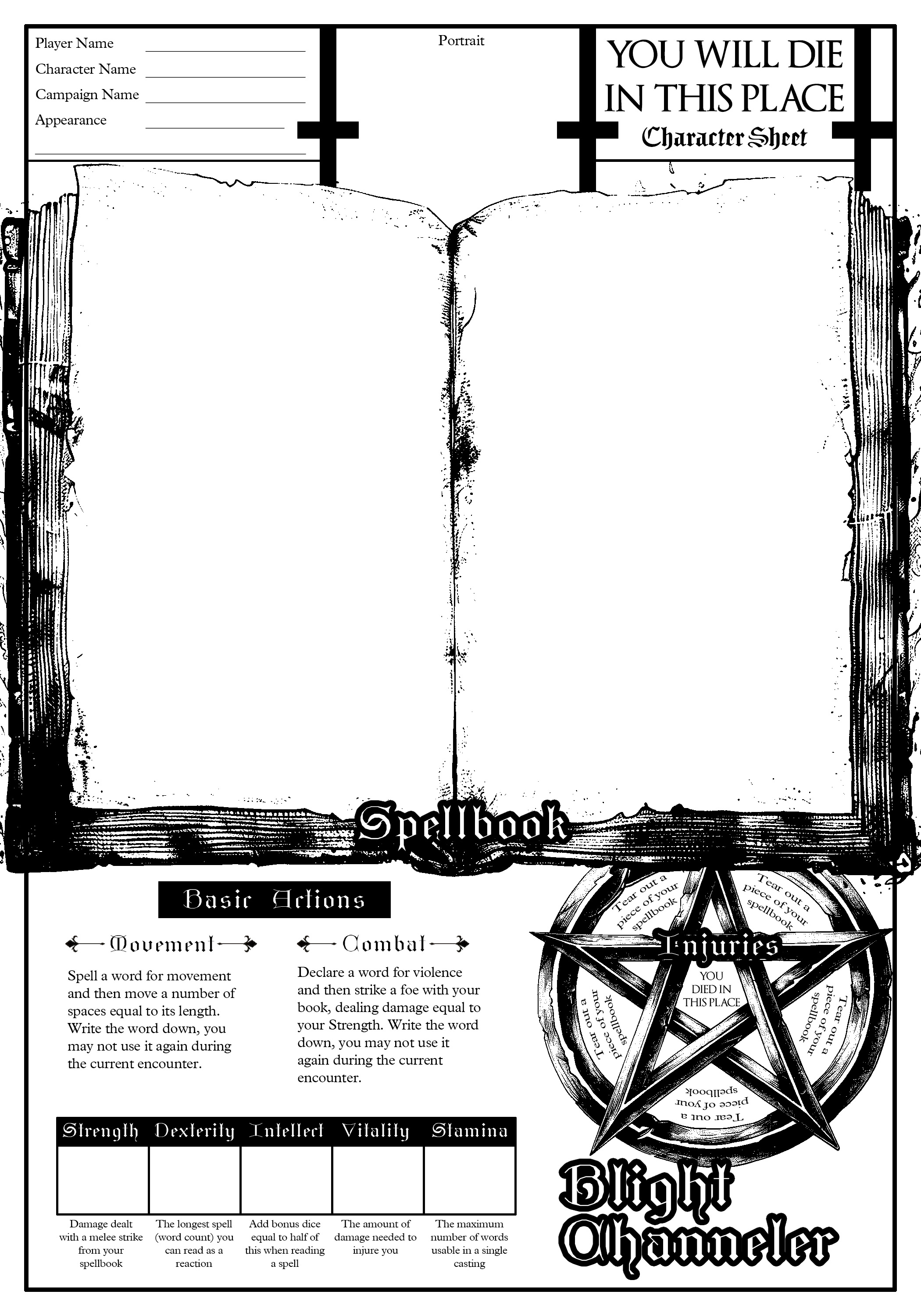Translating Narrative Themes Into Mechanics - Character Classes (part 1)
You Will Die In This Place is a nihilistic class-based dungeon crawl TTRPG where characters typically become weaker instead of stronger as they progress through the megadungeon of the Abyssal Labyrinth. I specifically chose to make the game class-based because I am frequently critical of class-based designs and wanted to explore this space. In my opinion, where class-based RPG designs excel is in their clear delineation of character responsibilities, which helps to prevent functional overlap between characters (allowing players to more easily have their own niche) as well as helping to guide less experienced roleplayers with an archetypical framework. However, problems can start to arise when classes become simply different flavour text and trappings veiling essentially the same set of mechanics.
For You Will Die In This Place, I was determined from the start to create a set of classes that were entirely mechanically distinct from each other, to the extent that each class would need its own unique character sheet to play. The immutables would become the core character stats (though each class would use these in different ways) and the ability to deal and receive damage (again, the how of this would be different for each character). In this way, damage effectively becomes the only universal form of the communication in the game, which ties directly into its core narrative themes of survival in an often-cruel world and the challenges inherent in communicating with others. Similarly, a player could theoretically learn their character and play the game just fine while having very little idea of how the other characters function. This adds considerable complexity and barriers to entry, but also great depth and replayability. You Will Die In This Place is a niche enough thing already that I judged this trade off worthwhile.
For the sake of documenting the process and the thoughts behind it, I want to go through some of the classes that I ended up with. I'm going to start with the Blight Channeler, the 'mage' class of the game, because its mechanical design is very driven by the core narrative themes of the game and the end result is something that is even more removed from traditional TTRPG design than most of the other classes.

---
'The thing about literature is that there are no reliable narrators. Everyone has an agenda, a bias, a belief they want to push. The Royal Orthodoxy preach a narrative of fear and oppression. They say the world is in a decline of our own making and that none are without sin. They consolidate their wealth and power, all the while keeping the masses uneducated and on the brink of poverty. It’s hard to find contradictions in their teachings when you can’t read and have no time for science or philosophy. All our woes have always been the doing of decadent and anarchistic scholars and unregistered mages, or so they say. Except those of us old enough to remember know that they blamed the lazy Muzeiiyd before us and necromancers before them. To point this out, or even speak of it aloud, is heresy of course and heretics are hung if they’re lucky.
The grimoires tell a different tale. Biased, of course, in their own way. Some claim to have been written by monks who have communed with entities beyond the walls of Ashendeep. Some appear to be the transcribed and partially translated myths of the Muzeiiyd oral tradition. Some rare texts even make the claim to have been written by something that was other than human. Most unnerving of all are the texts which claim to have been written by a human but give the distinct impression, through their subtle wrongness, that they were not. It is through the archival and critical examination of these texts that we can begin to piece together the truth of our world, if such a thing exists.
We don't know what caused the manablight yet. Some speculate that it is the result of an ancient war between long forgotten nations, the encroachment of some otherworldly entity, natural disaster, or perhaps it really is a kind of magical pollution of our own making. Regardless, it is true that something is happening, spreading and worming its way through the fabric of reality, slowly unwinding it into something formless and primordial. Tomes which once contained only the power of literature, now have power of a literal sort. Reading the words aloud creates a bridge that something ancient and powerful can cross. We are mere heretics and scholars no longer, for now is the age of the Blight Channeler.'
---
The inherent power of words and their ability to affect change is a core theme of You Will Die In This Place, as is decay, loss and a gradual descent into madness and then nothingness. I wanted the Blight Channeler to embody this in every aspect of their design. It had to use and revere words, and force its player to do the same, in a way that went beyond simply reading what things do. It had to force a mad scrawling of notes, the kind of thing that a player might idly do on their character sheet regardless, and instil such a weight in each one that they must be carefully considered.
To move within the world, during turn-based action, the Blight Channeler player must proclaim a word for movement (such as "strut" or "shamble") and scrawl it somewhere onto the back of their character sheet or a notepad. They may then move a number of spaces up to the length of that word (5 spaces for "strut", 7 for "shamble") and may not use the same word again within that encounter. The Blight Channeler literally moves through the world by describing and chronicling their motion.
So what of casting spells? The character sheet comes with a blank spell book that must be pre-populated with the names of spells chosen from a substantial list that includes offensive, defensive and utility abilities. To cast a spell they must sacrifice (and literally redact) words from its title. The more words they are prepared to sacrifice, the larger their casting pool becomes. Once the title of a spell is completely redacted, it is gone forever and can never be used again. This balanced the power of the caster with the knowledge that their power is inherently finite and every decision to use magic is important. Burn through the spell book too quickly and the ease of early progress will soon come to an end.
And when the Blight Channeler receives damage? If it passes a certain threshold, then they are injured. When the Blight Channeler is injured, they must tear off a piece of their character sheet that has to be at least large enough to cover a section of their injury track. This represents them trying to shield themselves by instinctively holding up their grimoires as a shield. Any spells that were on the torn off piece are lost. Any notes or pieces of backstory that were recorded on the back of the character sheet are also lost, or rather, the character's memory of them is lost. Again, this ties into the theme of gradual decline and loss.

Get You Will Die In This Place (development preview)
You Will Die In This Place (development preview)
A nihilistic dungeon crawler about death, art and identity.
| Status | In development |
| Category | Physical game |
| Author | Liz |
| Tags | Atmospheric, Creepy, Dark Fantasy, Dungeon Crawler, Horror, Narrative, Psychological Horror, Survival Horror, Tabletop, Tabletop role-playing game |
More posts
- Announcement - Selected for Gamefound RPG PartyJun 11, 2025
- Major Update - New Preview AvailableMay 11, 2025
- The Process of Building DungeonsMay 10, 2025
- The Cost of Art (And Maximising Value)May 07, 2025
- The Transient Nature of IdeasMay 06, 2025
- The Process of Creating MiniaturesMay 05, 2025
Leave a comment
Log in with itch.io to leave a comment.